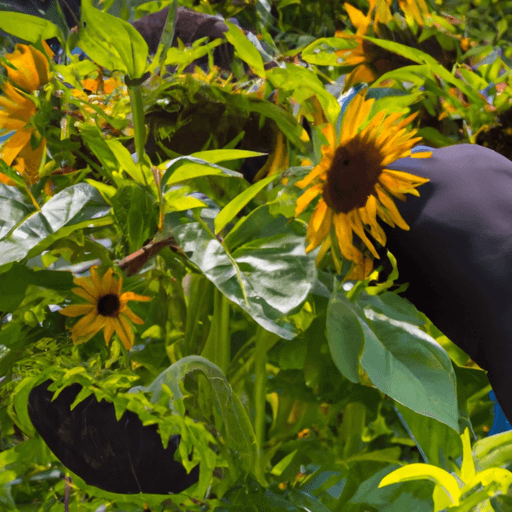Black oil sunflower seeds are a fantastic addition to any garden. They attract a wide variety of bird species with their high oil content and easy-to-crack shells. They are a favorite among backyard birds like cardinals, finches, and sparrows, as well as jays, magpies, and warblers.
In this article, we will explore the benefits of growing black oil sunflower seeds. We will also provide tips for planting and caring for them, as well as creative ways to use them.
By growing black oil sunflower seeds, you can enhance your garden and provide a sustainable food source for our feathered friends.
Benefits of Growing Black Oil Sunflower Seeds
Growing black oil sunflower seeds in your garden has several benefits. It can attract a wide variety of bird species and provide a consistent supply of nutritious birdseed.
Not only can you grow black oil sunflower seeds outdoors, but you can also grow them indoors. This is especially useful for those with limited garden space or for those who want to enjoy the benefits of growing sunflower seeds year-round.
By growing black oil sunflower seeds indoors, you can provide a continuous source of fresh birdseed for your backyard birds. Feeding black oil sunflower seeds to backyard birds has numerous benefits. These seeds are high in oil content, providing birds with essential fats and calories. They also have thinner shells, making them easier for small birds to crack open.
Choosing the Right Variety of Black Oil Sunflowers
When selecting the appropriate variety of black oil sunflowers, it’s important to consider factors such as height, maturity time, and seed size. Different varieties offer unique characteristics that may suit specific growing conditions or preferences. Here is a comparison table of four popular black oil sunflower varieties:
| Variety | Height | Maturity Time | Seed Size |
|---|---|---|---|
| Variety A | 6-8 feet | 65-75 days | Medium |
| Variety B | 8-10 feet | 75-85 days | Large |
| Variety C | 4-6 feet | 55-65 days | Small |
| Variety D | 10-12 feet | 85-95 days | Extra Large |
When growing sunflowers in containers, it’s important to choose a variety that is suitable for limited space and has a shorter maturity time. Varieties C and A would be good options, as they are more compact and have a shorter growing period. Additionally, consider the seed size, as smaller seeds are easier to handle in containers. With the right variety, you can enjoy the beauty and benefits of black oil sunflowers even in a small garden or balcony.
Tips for Planting Black Oil Sunflower Seeds
To ensure successful planting of black oil sunflower seeds, gardeners should choose a sunny location with loose soil and water the seeds regularly.
Black oil sunflowers are best planted in the spring, after the danger of frost has passed. These seeds can be directly sown into the ground or started indoors and transplanted later.
When choosing companion plants for black oil sunflowers, consider tall and sturdy plants that won’t shade or compete with them for nutrients. Good companion plants include zinnias, marigolds, cosmos, and cleome. These flowers not only add beauty to the garden but also attract pollinators and beneficial insects.
It’s important to space the sunflower plants properly to allow air circulation and prevent overcrowding.
With proper care and attention, black oil sunflower seeds will germinate and grow into tall, vibrant plants that will provide a bountiful harvest of seeds for both birds and humans alike.
Caring for Black Oil Sunflowers in Your Garden
Watering regularly and providing adequate sunlight are essential for the care of black oil sunflowers in a garden. These beautiful flowers require some special attention to ensure their healthy growth. Here are some tips for caring for black oil sunflowers in your garden:
-
Watering: Sunflowers need consistent moisture, especially during dry spells. Water them deeply once or twice a week, making sure the soil is evenly moist.
-
Sunlight: Black oil sunflowers thrive in full sun, so make sure they receive at least 6 to 8 hours of direct sunlight each day.
-
Soil Preparation: Before planting, prepare the soil by loosening it with a garden fork or tiller. Incorporate organic matter, such as compost, to improve drainage and fertility.
In addition to these care practices, it’s important to keep an eye out for garden pests, such as aphids and slugs, which can damage the sunflowers. Regularly inspect the plants and take appropriate measures to control pests if necessary.
With proper care and attention, your black oil sunflowers will flourish in your garden.
Harvesting and Storing Black Oil Sunflower Seeds
Harvesters should wait until the black oil sunflower seeds are fully matured before collecting them for storage. This ensures that the seeds have reached their maximum size and have developed their characteristic jet black color. Once harvested, the seeds can be saved and reused for future bird feeding or even for cooking purposes.
When it comes to saving and reusing black oil sunflower seeds, it is important to properly store them to maintain their freshness. Airtight containers, such as glass jars or plastic bags, can help prevent moisture and pests from damaging the seeds. Keep them in a cool, dry place, away from direct sunlight.
Black oil sunflower seeds can also be used in cooking. They can be ground into a fine powder and used as a substitute for flour in baking recipes. The nutty flavor of the seeds adds a delicious twist to breads, muffins, and cookies. They can also be used as a topping for salads, yogurt, or oatmeal, adding a crunchy texture and a boost of nutrition.
Table:
| Saving and Reusing Black Oil Sunflower Seeds | Cooking with Black Oil Sunflower Seeds |
|---|---|
| Properly store in airtight containers | Grind into a fine powder for baking |
| Keep in cool, dry place | Use as a topping for salads, yogurt |
| Protect from moisture and pests | Add crunch and nutrition to dishes |
Attracting a Variety of Birds With Black Oil Sunflowers
Bird enthusiasts can attract a wide variety of bird species by planting black oil sunflowers in their gardens. These sunflowers, with their jet black seeds, are a popular type of birdseed that provide more nutrition and calories for birds. They have thinner shells, making them easier for small birds to crack.
Black oil sunflower seeds are the most popular seed among backyard birds like northern cardinals, finches, sparrows, nuthatches, and chickadees. Other birds such as jays, magpies, pigeons, and warblers also enjoy these seeds. Ground-feeding birds like doves, starlings, and robins will also eat black oil sunflower seeds.
Creative Ways to Use Black Oil Sunflower Seeds
After attracting a variety of birds with black oil sunflowers, you can get creative with the use of these seeds.
One interesting way to incorporate black oil sunflower seeds into your culinary endeavors is by using them in baking. These nutritious seeds can add a delightful crunch and nutty flavor to bread, muffins, granola bars, and even cookies.
You can also use them as a topping for salads or roasted vegetables to enhance their texture and taste.
Furthermore, black oil sunflower seeds can be used in various craft projects. Their small, jet-black shape makes them perfect for creating intricate designs on greeting cards, picture frames, or even jewelry.
You can also glue these seeds onto wooden or clay pots to add a rustic touch to your garden decor.
With their versatility and rich color, black oil sunflower seeds provide endless possibilities for both culinary and artistic endeavors.
DIY Bird Feeders for Black Oil Sunflower Seeds
Homeowners can easily create their own DIY bird feeders using simple materials found around the house. Making bird feeders is a fun and rewarding project that can attract a variety of bird species to your backyard. Here are three popular bird feeder designs for using black oil sunflower seeds:
-
Plastic Bottle Feeder: Cut holes near the bottom of a clean, empty plastic bottle and insert wooden dowels for perches. Fill the bottle with black oil sunflower seeds and hang it securely.
-
Pinecone Feeder: Tie a string around the top of a pinecone and coat it with peanut butter. Roll the pinecone in black oil sunflower seeds and hang it from a tree branch.
-
Milk Jug Feeder: Cut out a large opening on one side of a clean, empty milk jug. Attach a wooden dowel below the opening for a perch. Fill the jug with black oil sunflower seeds and hang it up.
These DIY bird feeder projects are not only eco-friendly but also provide a sustainable food source for birds in your garden.
Troubleshooting Common Issues With Black Oil Sunflower Seeds
To ensure optimal bird feeding, it is important to troubleshoot common issues that may arise with black oil sunflower seeds.
One common issue is pests. Birds are not the only creatures attracted to these seeds. Squirrels, raccoons, and other critters may try to steal the seeds from your bird feeders. To prevent this, consider using squirrel-proof feeders or placing baffles on poles to keep pests away.
Another issue to watch out for is mold. If the seeds become damp or wet, they can develop mold, which can be harmful to birds. To prevent mold, make sure to store the seeds in a dry and cool place. Regularly clean and dry your bird feeders to avoid moisture buildup.
Black Oil Sunflower Seeds: A Sustainable Gardening Choice
After troubleshooting common issues with black oil sunflower seeds, it’s time to explore the sustainable gardening benefits of these seeds.
Incorporating black oil sunflower seeds into your garden not only benefits the birds but also the environment.
Composting Benefits:
- Black oil sunflower seeds can be added to your compost pile, providing a valuable source of nutrients for your plants.
- The seeds break down quickly, contributing to the decomposition process and creating rich, fertile compost.
- Composting black oil sunflower seeds helps reduce waste and promotes a more sustainable gardening practice.
Companion Planting:
- Black oil sunflowers can be used as companion plants in your garden.
- They attract beneficial insects like bees and butterflies, which help with pollination and pest control.
- Planting black oil sunflowers alongside other vegetables or flowers can create a balanced ecosystem in your garden, promoting overall plant health.
Frequently Asked Questions
Can Black Oil Sunflower Seeds Be Used for Cooking or Baking?
Yes, black oil sunflower seeds can be used for cooking and baking. They are a nutritious ingredient that adds a nutty flavor and crunch to dishes. They are also rich in healthy fats, protein, and vitamins.
How Long Does It Take for Black Oil Sunflowers to Grow From Seed to Full Maturity?
Black oil sunflowers typically take about 70-100 days to grow from seed to full maturity. They thrive in loose soil and full sun. Common pests include birds, squirrels, and insects like aphids and caterpillars.
Can Black Oil Sunflower Seeds Be Used to Attract Squirrels or Other Wildlife?
Black oil sunflower seeds can attract squirrels and other wildlife. They are also beneficial for bird feeders as they provide nutrition and calories for a wide variety of bird species.
Are There Any Specific Soil Requirements for Growing Black Oil Sunflower Seeds?
Black oil sunflower seeds prefer loose soil with good drainage. Different sunflower seed varieties may have specific soil requirements, so it is important to choose the right variety for optimal growth.
Can Black Oil Sunflower Seeds Be Stored for Long Periods of Time Without Losing Their Nutritional Value?
Yes, black oil sunflower seeds can be stored for long periods of time without losing their nutritional value. They have a shelf life of up to a year if stored properly in a cool, dry place.







